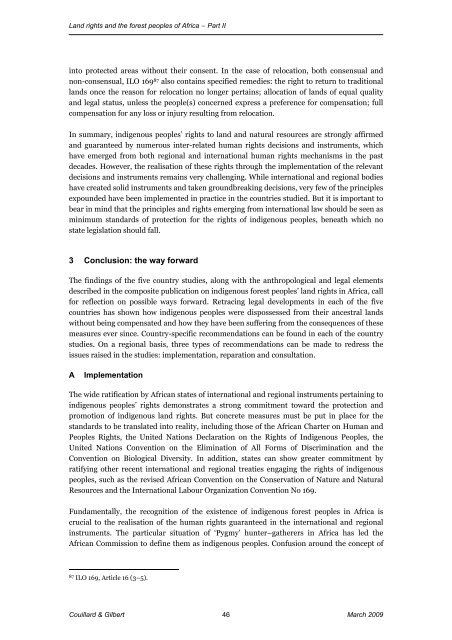Land Rights and the Forest Peoples of Africa
Land Rights and the Forest Peoples of Africa
Land Rights and the Forest Peoples of Africa
Create successful ePaper yourself
Turn your PDF publications into a flip-book with our unique Google optimized e-Paper software.
<strong>L<strong>and</strong></strong> rights <strong>and</strong> <strong>the</strong> forest peoples <strong>of</strong> <strong>Africa</strong> – Part II<br />
into protected areas without <strong>the</strong>ir consent. In <strong>the</strong> case <strong>of</strong> relocation, both consensual <strong>and</strong><br />
non-consensual, ILO 169 87 also contains specified remedies: <strong>the</strong> right to return to traditional<br />
l<strong>and</strong>s once <strong>the</strong> reason for relocation no longer pertains; allocation <strong>of</strong> l<strong>and</strong>s <strong>of</strong> equal quality<br />
<strong>and</strong> legal status, unless <strong>the</strong> people(s) concerned express a preference for compensation; full<br />
compensation for any loss or injury resulting from relocation.<br />
In summary, indigenous peoples’ rights to l<strong>and</strong> <strong>and</strong> natural resources are strongly affirmed<br />
<strong>and</strong> guaranteed by numerous inter-related human rights decisions <strong>and</strong> instruments, which<br />
have emerged from both regional <strong>and</strong> international human rights mechanisms in <strong>the</strong> past<br />
decades. However, <strong>the</strong> realisation <strong>of</strong> <strong>the</strong>se rights through <strong>the</strong> implementation <strong>of</strong> <strong>the</strong> relevant<br />
decisions <strong>and</strong> instruments remains very challenging. While international <strong>and</strong> regional bodies<br />
have created solid instruments <strong>and</strong> taken groundbreaking decisions, very few <strong>of</strong> <strong>the</strong> principles<br />
expounded have been implemented in practice in <strong>the</strong> countries studied. But it is important to<br />
bear in mind that <strong>the</strong> principles <strong>and</strong> rights emerging from international law should be seen as<br />
minimum st<strong>and</strong>ards <strong>of</strong> protection for <strong>the</strong> rights <strong>of</strong> indigenous peoples, beneath which no<br />
state legislation should fall.<br />
3 Conclusion: <strong>the</strong> way forward<br />
The findings <strong>of</strong> <strong>the</strong> five country studies, along with <strong>the</strong> anthropological <strong>and</strong> legal elements<br />
described in <strong>the</strong> composite publication on indigenous forest peoples’ l<strong>and</strong> rights in <strong>Africa</strong>, call<br />
for reflection on possible ways forward. Retracing legal developments in each <strong>of</strong> <strong>the</strong> five<br />
countries has shown how indigenous peoples were dispossessed from <strong>the</strong>ir ancestral l<strong>and</strong>s<br />
without being compensated <strong>and</strong> how <strong>the</strong>y have been suffering from <strong>the</strong> consequences <strong>of</strong> <strong>the</strong>se<br />
measures ever since. Country-specific recommendations can be found in each <strong>of</strong> <strong>the</strong> country<br />
studies. On a regional basis, three types <strong>of</strong> recommendations can be made to redress <strong>the</strong><br />
issues raised in <strong>the</strong> studies: implementation, reparation <strong>and</strong> consultation.<br />
A<br />
Implementation<br />
The wide ratification by <strong>Africa</strong>n states <strong>of</strong> international <strong>and</strong> regional instruments pertaining to<br />
indigenous peoples’ rights demonstrates a strong commitment toward <strong>the</strong> protection <strong>and</strong><br />
promotion <strong>of</strong> indigenous l<strong>and</strong> rights. But concrete measures must be put in place for <strong>the</strong><br />
st<strong>and</strong>ards to be translated into reality, including those <strong>of</strong> <strong>the</strong> <strong>Africa</strong>n Charter on Human <strong>and</strong><br />
<strong>Peoples</strong> <strong>Rights</strong>, <strong>the</strong> United Nations Declaration on <strong>the</strong> <strong>Rights</strong> <strong>of</strong> Indigenous <strong>Peoples</strong>, <strong>the</strong><br />
United Nations Convention on <strong>the</strong> Elimination <strong>of</strong> All Forms <strong>of</strong> Discrimination <strong>and</strong> <strong>the</strong><br />
Convention on Biological Diversity. In addition, states can show greater commitment by<br />
ratifying o<strong>the</strong>r recent international <strong>and</strong> regional treaties engaging <strong>the</strong> rights <strong>of</strong> indigenous<br />
peoples, such as <strong>the</strong> revised <strong>Africa</strong>n Convention on <strong>the</strong> Conservation <strong>of</strong> Nature <strong>and</strong> Natural<br />
Resources <strong>and</strong> <strong>the</strong> International Labour Organization Convention No 169.<br />
Fundamentally, <strong>the</strong> recognition <strong>of</strong> <strong>the</strong> existence <strong>of</strong> indigenous forest peoples in <strong>Africa</strong> is<br />
crucial to <strong>the</strong> realisation <strong>of</strong> <strong>the</strong> human rights guaranteed in <strong>the</strong> international <strong>and</strong> regional<br />
instruments. The particular situation <strong>of</strong> ‘Pygmy’ hunter–ga<strong>the</strong>rers in <strong>Africa</strong> has led <strong>the</strong><br />
<strong>Africa</strong>n Commission to define <strong>the</strong>m as indigenous peoples. Confusion around <strong>the</strong> concept <strong>of</strong><br />
87<br />
ILO 169, Article 16 (3–5).<br />
Couillard & Gilbert 46<br />
March 2009





